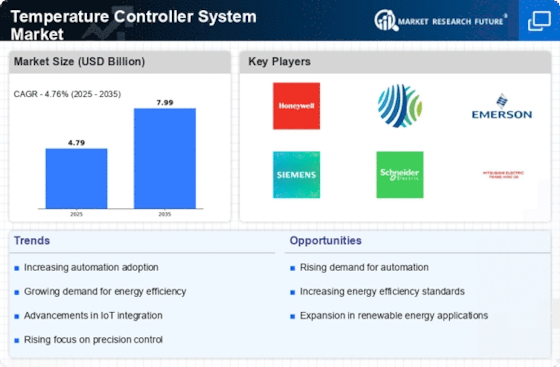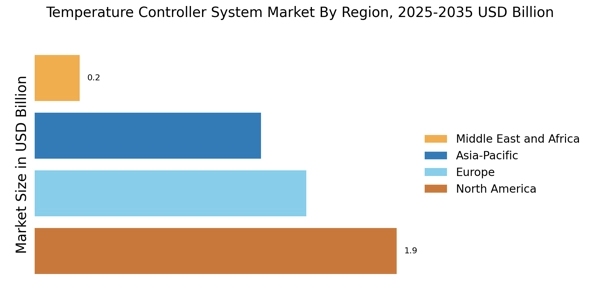Growth in HVAC Systems
The expansion of heating, ventilation, and air conditioning (HVAC) systems is another significant driver for the Temperature Controller System Market. With urbanization and the rise in construction activities, there is a growing need for efficient HVAC solutions that maintain optimal indoor climates. The HVAC market is expected to witness substantial growth, with temperature controllers being integral to these systems. These controllers ensure that temperature settings are maintained accurately, thereby enhancing energy efficiency and comfort. As the demand for smart HVAC systems increases, the Temperature Controller System Market is likely to benefit from innovations that integrate advanced temperature control technologies, further driving market growth.
Rising Demand for Automation
The increasing demand for automation across various industries is a key driver for the Temperature Controller System Market. As industries strive for enhanced efficiency and reduced operational costs, the integration of automated temperature control systems becomes essential. For instance, the manufacturing sector is witnessing a shift towards automated processes, which necessitates precise temperature regulation to ensure product quality. According to recent data, the automation market is projected to grow significantly, with temperature control systems playing a pivotal role in this transformation. This trend is likely to propel the Temperature Controller System Market, as companies seek to implement advanced technologies that facilitate real-time monitoring and control of temperature-sensitive processes.
Increasing Focus on Sustainability
The growing emphasis on sustainability and environmental responsibility is emerging as a significant driver for the Temperature Controller System Market. Companies are increasingly seeking solutions that not only enhance efficiency but also minimize their carbon footprint. Temperature control systems that optimize energy usage contribute to sustainability goals by reducing waste and lowering energy costs. As organizations adopt greener practices, the demand for energy-efficient temperature controllers is likely to rise. This trend is supported by various initiatives aimed at promoting sustainable industrial practices, which further propels the Temperature Controller System Market. The alignment of temperature control technologies with sustainability objectives is expected to create new opportunities for market growth.
Regulatory Standards and Compliance
The implementation of stringent regulatory standards regarding temperature control in various sectors is a crucial driver for the Temperature Controller System Market. Industries such as pharmaceuticals, food and beverage, and chemicals are subject to regulations that mandate precise temperature monitoring to ensure product safety and quality. Compliance with these regulations necessitates the adoption of advanced temperature control systems, which can provide accurate data logging and reporting capabilities. As regulatory bodies continue to enforce these standards, the demand for reliable temperature controllers is expected to rise, thereby positively impacting the Temperature Controller System Market. This trend underscores the importance of maintaining compliance to avoid penalties and ensure consumer safety.
Technological Advancements in Temperature Control
Technological advancements in temperature control systems are significantly influencing the Temperature Controller System Market. Innovations such as IoT-enabled controllers and advanced algorithms for predictive analytics are enhancing the capabilities of temperature management. These technologies allow for remote monitoring and control, enabling users to optimize processes and reduce energy consumption. The market for smart temperature controllers is anticipated to grow as industries increasingly adopt these technologies to improve operational efficiency. Furthermore, the integration of machine learning and artificial intelligence in temperature control systems is likely to provide enhanced predictive maintenance, thereby reducing downtime and operational costs. This evolution in technology is expected to drive the Temperature Controller System Market forward.
















